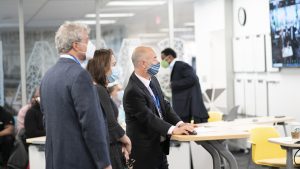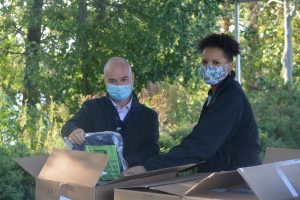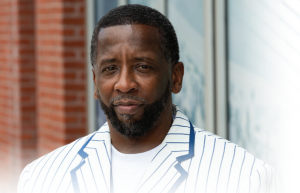Right now, over two million Americans are incarcerated. To put this into perspective, this adds up to roughly half the population of Connecticut, double that of Rhode Island, and nearly triple that of Wyoming.
U.S. penitentiaries house over 25% of incarcerated individuals worldwide — giving us a higher prison population than any other country. From outside a cell, it can be easy to make blanket judgments about those serving time, regardless of how rightful their sentence may be. However, when you refrain from casting a social verdict, you’ll find a different picture emerges.
Prosecuting stigma
Isolated and ostracized, most justice-involved individuals long for the comfort and support we often take for granted: community, opportunity, and companionship — all of which can seem a far cry from penitentiary walls.
Upon reentry, individuals are seldom met with the support necessary to reclaim their livelihoods. Justice-involved individuals often slip through the cracks after release. Without the proper resources and guidance, it becomes easy to fall into the same traps that ensnared them in the first place. This phenomenon — referred to as recidivism — is both pervasive and destructive. In fact, 67.8% of released individuals meet this fate — finding themselves arrested again.
For Dr. Matt Connell, MBA, combatting recidivism and eliminating social stigma defines his life’s work. As the director of the ENet program at Goodwin University and University of Bridgeport, Connell defies outdated notions about incarceration — helping to provide justice-involved students not only with career-ready training but with community-wide support. “The mission of ENet is to provide an entrepreneurial education to those who’ve been justice-involved,” Connell delineates. We’re focused on trying to provide something that will correlate to financial freedom, career advancement, independence, and generational wealth.”

While programs like ENet aren’t exclusive to Goodwin or UB, Connell’s approach differs from traditional programming. “We’ve been one of the only programs in the state wherein students can come home during their time as a student and still continue their studies,” he explains. “Our last cohort had four students come home and finish their program via Zoom.”

Matt Connell has seen ENet make a meaningful difference firsthand. “Research shows that students who have been incarcerated and pursue higher education are less likely to be reincarcerated in the future,” he explains. “The recidivism rate for our students is much lower than the national average.”
Our ENet graduates are giving back
Connell finds himself immensely inspired by the individuals whom he mentors. “Besides the connections I’m making with the students, I value playing a little part in providing some type of support for people,” he shares. “But perhaps the thing I value most is teaching super smart individuals who are passionate and committed to their futures.”
One such individual is Ed Andrews. Since completing his ENet certificate in 2019, Andrews has worked tirelessly to support justice-involved individuals. In addition to creating meaningful opportunities for people to reclaim their livelihoods, Andrews is flipping the script that surrounds American incarceration — helping educate communities about the social inequities and barriers that feed the cycle of recidivism.
Ed Andrews’ Story

Growing up, Edward “Ed” L. Andrews didn’t anticipate that he would one day publish a novel inspired by his own coming of age story amidst the streets of Brooklyn, New York. Having never planned to become an author, Andrews didn’t put pen to paper with the intention of finding fame or notoriety. In fact, when he wrote The Reminder, it was an exercise in solace and self-recovery. “It was a way for me to release some pain,” Andrews recounts. “It was therapeutic for me.”
Now serving as an Urban Trauma Specialist for communities nationwide, Andrews found his calling in the same unlikely place where he authored his novel — from the inside of a penitentiary. While incarcerated, he conceived the idea for SCRIP— a 501(c)(3) nonprofit officially established in 2019.
SCRIP, which stands for Second Chance Reentry Initiative Program, is based out of Hartford, Connecticut. The organization is dedicated to helping marginalized individuals overcome societal constraints and social challenges to reclaim their livelihoods and find professional success.
Understanding urban trauma
To appreciate Andrews’ vision for SCRIP, one must consider the impact of urban trauma — the very field of Ed’s specialty. Urban trauma is a deep-seated psychological phenomenon experienced by those residing in high-conflict communities. From poverty and food insecurity to violence and loss, hardship can be an inescapable reality, leading to toxic stress and emotional turmoil.
The exhaustive trauma of toxic stress can trap individuals in a self-subsisting trap of fight, flight, freeze, or fawn. Constantly reexperiencing these exacerbated emotions makes it difficult to achieve balance — suspending many individuals in a heightened state that leads to anger, mistrust, perpetual fear, and an overwhelming sense of rejection. Trapped under the thumb of these fraught emotions, individuals struggle to achieve personal advancement and thrive. Much like post-traumatic stress disorder (PTSD), urban trauma has genetic factors, too. Routine exposure to toxic stress has the capacity to alter us on a cellular level. Consequently, our hardships can impact future generations, even if only second-hand.
Urban trauma, however, tends to carry broader social implications than PTSD or toxic stress. Because urban trauma most dominantly affects individuals from historically marginalized communities, it takes its root in racism. From the appalling practices of slavery to modern-day injustices such as mass incarceration, Black and Brown communities have struggled for equality and inclusion — often being met by marginalization, prejudice, and bias. The pervasive effects of racism have facilitated urban trauma; those who find themselves sequestered in communities teeming with strife struggle to find equitable means to remove themselves from a merciless cycle.
Addressing the reentry gap
Through personal and professional experience, Ed understands the gravity of these issues. Consequently, he’s made it SCRIP’s mission to provide holistic programming that not only helps negate the effects of urban trauma, but helps those experiencing it heal, find personal and professional fulfillment, and defy its vicious nature.
But when Andrews first conceived of SCRIP, it wasn’t only a means to address urban trauma — he also saw it as an opportunity to combat recidivism. “After serving 22 years,” he offers, “I saw a big gap that was missing for people to be successful with their reentry.”
With a mission to defy urban trauma and recidivism, Andrews joined ENet in 2018 — choosing to focus his studies on Business Start-Ups. In addition to helping him develop the strategies necessary to start a nonprofit, he found the personal support offered by faculty to be a powerful reinforcer. “ENet brought us back to reality,” he shares. “We’d go to class in person and have intermissions in between. The professors made us feel accepted, educated us on valuable things, and gave me a lot of insight.”
Ed found incomparable value in the mentorship of Dr. Matt Connell, who made himself an immediate ally to his students. “Professor Connell was always there when I needed answers to questions, no matter what time of day,” he reflects.
Multiple means to a meaningful impact
Now five years underway, SCRIP offers a breadth of programs to alleviate urban trauma and disrupt the snare of recidivism. These programs are products of Andrews’ envisioning — each speaking volumes of his will to make a meaningful impact.
One of Ed’s most successful programs is ASCEND — the Academic, Social, Counseling, Expert-Mentoring, and Networking Development program. By providing formerly incarcerated individuals opportunities to develop personal and professional skills, ASCEND curbs the likelihood of recidivism. With the guidance of expert mentors, participants in this 8-week program learn about the causes and effects of urban trauma. Moreover, they receive personalized financial and career guidance — helping them embrace autonomy and personal responsibility. Although SCRIP makes Hartford its headquarters, the ASCEND program operates nationally — providing support to justice-involved individuals in communities coast-to-coast.
Another program founded by Andrews is COPE — the Career Opportunities and Pathways to Employment program. Like ASCEND, COPE helps justice-involved individuals find successful reentry. However, COPE’s primary emphasis is on employment and career-readiness. Over the 18-week agenda, participants connect with internship opportunities, receive professional referrals, and sometimes even find job placements. Eighteen weeks doesn’t entirely mark the end, either — COPE participants benefit from lifelong access to individualized career coaching.
Through SCRIP, Ed Andrews has even launched a residential program. Operating out of Manchester, CT, CARE aims to satisfy the employment and financial needs of its participants over a 4-month residency. The program enables individuals to regain financial independence by helping them establish savings accounts. Other SCRIP offerings include youth programs, urban male and female initiatives, and more.
Addressing the reentry gap
Since 2019, Ed Andrews has not only found success running SCRIP but as a public speaker, too. “I appear at different organizations and colleges to talk about topics related to incarceration and urban trauma,” he offers.
In addition to helping today’s communities recover, Andrews has his sights set on the future. He is currently pursuing a master’s degree in social work — all while pushing the envelope and looking for new ways to help SCRIP build momentum. “We’re planning to expand the current program offerings and provide social work internships,” he explains.
And that’s not to forget his second book, which is now in the works, too.
Aside from comprehensive programming, SCRIP offers educational and training resources. To learn more about SCRIP and its programs, or make a donation, visit SCRIP online or call 860-400-2488.

Bri Gagné is a marketing content writer at Goodwin University, bringing backgrounds in literary studies, creative storytelling, Universal Design for Learning (UDL), and social justice. They earned their bachelor’s degree in English Literature and Film Studies from University of Connecticut and a master’s in education from Eastern Connecticut State University.
After teaching English abroad and locally, Bri transitioned to a full-time writing career, contributing to the University’s educational narratives and brand-building efforts. They plan to begin their Master of Fine Arts in creative writing in 2025.

